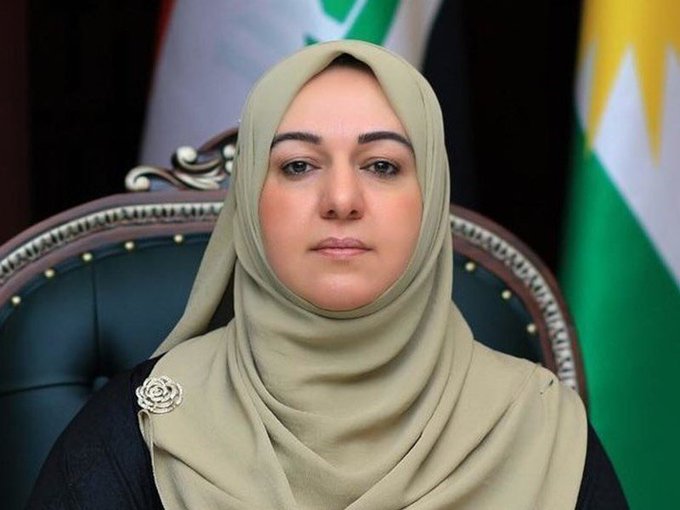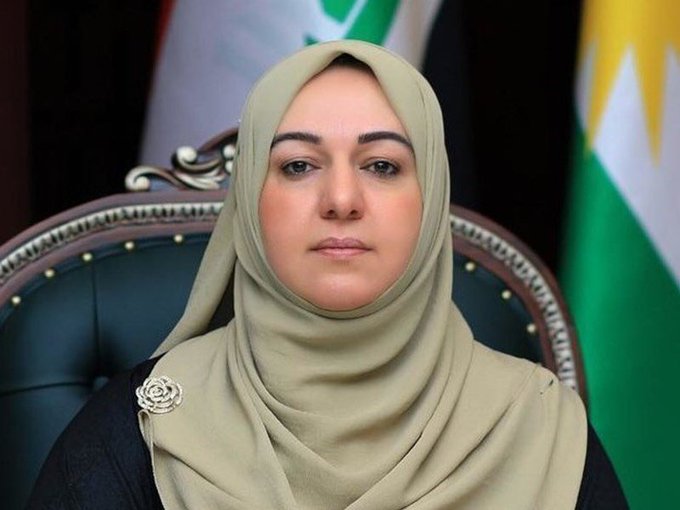We are doing a theme post around favorite grunge songs. I am picking "Rooster" by Alice In Chains. AIC was a big grunge band but I think they get overlooked a great deal these days.
This is C.I.'s "Iraq snapshot:"
Monday, February 1, 2021. The KRG remembers a 2004 attack, Hobby Lobby continues ripping off the world and more.
As the new month kicks off, Margaret Griffis (ANTIWAR.COM) reports of January, "At least 168 people were killed, and 295 were wounded during January. Furthermore, mass graves gave up at least 248 known victims. In December, 172 people were killed, and 200 were wounded."
Meanwhile, one US company continues to rip off the Middle East and all it takes is one 'woopsie!' and we all pretend like it didn't happen. Anugrah Kumar (CHRISTIAN POST) reports:
Weeks after the Museum of the Bible in Washington transferred control of 5,000 disputed manuscripts and bits of papyrus to the U.S. government, officials have repatriated the artifacts to Egypt, from where the items were thought to have been illegally shipped during the Arab Spring.
The handover of the artifacts, which included manuscript fragments, funeral masks, parts of coffins, and the heads of statues, was preceded by extensive discussions with Egyptian officials that started in late 2017, MOTB Chairman of the Board Steve Green said in a statement last week.
Green, president of Hobby Lobby, an arts and crafts retail chain, explained that while the talks with Egyptian officials had been “cordial and promising, we were not able to finalize the desired agreements nor resolve the logistics of shipping the items to Iraq and Egypt,” after which MOTB sought the help of U.S. government officials to assist with the delivery of the items.
[. . .]
In July 2017, Hobby Lobby agreed to pay $3 million and forfeit thousands of biblical cuneiform tablets and clay bullae to settle a civil complaint the U.S. government filed against the company, alleging that the Christian-owned arts-and-crafts retailer acquired artifacts originating in modern-day Iraq that were unlawfully smuggled from the United Arab Emirates and Israel as “ceramic tiles” or “clay tiles (sample).”
Hobby Lobby keeps ending up with items that they have no right to. In 2018, Jane Arraf (NPR) reported on Hobby Lobby:
But looters know. The roughly 250 tablets Frahm examined in 2016 were among 5,500 objects, including ancient cylinder seals and clay seal impressions known as bullae, smuggled into the U.S. starting in 2010. Shipped from the United Arab Emirates and Israel without declaring their true Iraqi origin, some of them were marked "ceramic tiles" or "clay tiles (sample)."
They'd been purchased by Hobby Lobby for $1.6 million.
In a settlement last year with the Justice Department, Hobby Lobby agreed to forfeit the objects and paid a $3 million fine. In May, about 3,800 objects were handed back to the Iraqi government at a ceremony at its Washington, D.C., embassy, and will be returned to Iraq later this year.
Last November, Hobby Lobby president Steve Green, the son of the craft store chain's founder David Green, opened a Museum of the Bible in Washington, D.C., which contains another $201 million worth of ancient artifacts tied to Hobby Lobby. The museum said in a statement last July that "None of the artifacts identified in the settlement are part of the Museum's collection, nor have they ever been."
Why is Hobby Lobby still in business? The Gilgamesh Tablet is another 'issue' for Hobby Lobby. How many times are they going to be caught with items that shouldn't have been in their possession? And what does it say about Hobby Lobby customers that they keep going to the stores despite this ongoing scandal? Supposedly, we're in 'cancel culture' times. Yet no one wants to take their buying power to a US store that doesn't exploit and grave rob?
Beginning in 2009, representatives of Hobby Lobby were warned that artifacts they were purchasing were likely looted from Iraq.[22] The purchases had been made for the Museum of the Bible, which they were sponsoring. In 2018, the United States District Court for the Eastern District of New York directed Hobby Lobby to return the artifacts and pay a fine of US$3,000,000. Hobby Lobby returned over 5500 items in May 2018.[23][24][25] Among these, were nearly 4000 tablets supposed to be from the lost city of Irisagrig which had been delivered to Hobby Lobby marked as "tile samples."[26]
In April 2020, the centerpiece of the Museum of the Bible's collection, the fragments of the Dead Sea Scrolls, were declared to be fakes.[27]
After its authenticity was questioned, the museum removed the display of a miniature bible which a NASA astronaut had purportedly carried to the moon.[28]
In a further blow to the Museum of the Bible's credibility board chairman, Steve Green, who is also president of the Hobby Lobby stores, announced the museum will be returning over eleven thousand artifacts to Egypt and Iraq. The collection includes thousands of papyrus scraps and ancient clay pieces. Manchester University papyrologist Roberta Mazza stated that the Green family "poured millions on the legal and illegal antiquities market without having a clue about the history, the material features, cultural value, fragilities, and problems of the objects."[29]
In early July 2017, US federal prosecutors filed a civil complaint in the Eastern District of New York under the case name United States of America v. Approximately Four Hundred Fifty Ancient Cuneiform Tablets and Approximately Three Thousand Ancient Clay Bullae.[30] On July 5, 2017, Hobby Lobby consented to a settlement requiring forfeiture of the artifacts and payment of a fine of $3 million and the return of over 5500 artifacts.[31][32][33] In January of 2021 Museum of the Bible’s Chairman of the Board, Steve Green released the following statement “we transferred control of the fine art storage facility that housed the 5,000 Egyptian items to the U.S. government as part of a voluntary administrative process. We understand the U.S. government has now delivered the papyri to Egyptian officials.” This in addition to 8000 clay objects also being transferred to Baghdad’s Iraq Museum.[34]
This return includes the "Gilgamesh Dream Tablet," containing part of the Epic of Gilgamesh, discovered in Iraq in 1853, sold by the Jordanian Antiquities Association to an antiquities dealer in 2003,[35] and sold again by Christie's auction house to Hobby Lobby in 2014 for $1.6 million. The auction house lied about how the artifact had entered the market, claiming it had been on the market in the United States for decades. In September 2019, federal authorities seized the tablet, and in May 2020, a civil complaint was filed to forfeit it.[36][37]
Again, I don't understand how people know this and continue to shop at Hobby Lobby. I guess theft and stolen history don't matter that much? I guess some Americans who pretend they're politically aware would rather lie and Tweet that Senator Tom Cotton is guilty of stolen valor then call out real theft.
In other news, Massoud Barzani Tweeted:
There is no progress in Iraq. Massoud could have Tweeted the above any year since the US-led invasion of 2003. Massoud is no longer president of the KRG, he's now just president of the KDP political party. But there is never any progress in Iraq.
I can remember Bully Boy Bush occupying the White House and various bodies -- including Brookings -- warning that the issue of Kirkuk needed to be resolved before Iraq could move forward. All these years later, Kirkuk remains a disputed area of land -- both the central government out of Baghdad and the KRG continue to claim it. Nothing gets accomplished, nothing gets settled. The way to settle the issue of Kirkuk was written into Iraq's constitution; however, Article 140 has never been implemented -- all these years later. In 2019, Hawre Hasan Hama wrote a piece of INDIA QUARTERLY: A JOURNAL OF INTERNATIONAL AFFAIRS which noted:
The Iraqi state and the Kurds have always been at the odds over the territory around Kirkuk, particularly following the discovery of oil in the province in 1927. Both sides have claimed ownership of the province since that time and have sought to gain advantage over the other through various means. The region was subjected to a forced demographic change under the Arabisation policy during the reign of Ba’ath Party between 1968 and 2003. Following the overthrow of Saddam’s regime in 2003, the status of Kirkuk was to be constitutionally and peacefully resolved according to Article 58 of the 2004 interim constitution and then Article 140 of the 2005 permanent constitutions, which called for normalisation, a census, and a referendum in Kirkuk and other disputed areas to determine the will of their residents. Practically, however, various Iraqi governments and the two dominant Kurdish parties, the Patriotic Union of Kurdistan and the Kurdistan Democratic Party, were able to politicise implementation of Article 140. Although each blame the other, all share responsibility for the lack of implementation. This research investigates that experience and argues that the joint administration is the optimal scenario in the short run and independent region within the Iraqi state would be the best-case scenario in the long term.
Today, the Kurdistan Parliament Tweets the following from Speaker Rewaz Faiq:
The bombing of Erbil in 2004? The Australian Government notes:
Twin suicide bombings blamed by Kurds on local Islamist militant groups killed approximately 101 people in Erbil in February 2004 (‘Irbil bombings toll reaches 101’ 5 2004, BBC News, 3 February http://news.bbc.co.uk/2/hi/middle_east/3457065.stm – Accessed 24 June 2009 – Attachment 9).
The death toll eventually reached 101 while those injured numbered 246. In 2017, RUDAW issued the following.
Today? Where are the promised elections? Adil Abdul-Mahdi was Prime Minister of Iraq from October 25, 2018 to May 6, 2020. No, that was not a full term. October of 2019 (actually September 30, 2019 but the press narrative has gone with October 1, 2019) protests start in Iraq and continue to this day. These protests against corruption, lack of jobs, lack of basic services and more eventually forced Adil to announce his resignation because his term was such a failure. May 7, 2020, Mustafa al-Kadhimi became prime minister. He was supposed to call for immediate elections -- his was to be a brief term. But when he finally called for elections, it was for June of 2021. And now? They've been futher postponed to October. Dana Taib Menmy (ALJAZEERA) reports:
Iraq’s leaders pushed to postpone parliamentary elections fearing public discontent would lead to their removal from power, an analyst with ties to the government says.
Prime Minister Mustafa al-Kadhimi, President Barham Salih, and Speaker of the Parliament Mohammad al-Halbusi wanted a later vote over concerns about their prospects for re-election and sought to buy time, said Mohammad Bakhtiar, a Kurdish political analyst who meets regularly with Iraqi decision-makers.
“At least two of the three leaders of Iraq who favoured early election have realised that their chances of being re-elected are minimal,” Bakhtiar said.
In a bid to delay the elections, the three Iraqi leaders met on January 12 and later with the United Nations Assistance Mission for Iraq (UNAMI) and election commission officials, he told Al Jazeera.
After a request from Iraq’s Independent High Election Commission (IHEC), the government last week announced the postponement of the country’s elections from June 6 to October 10.
Bakhtiar said it was unlikely the vote would take place in October and suggested May 2022 was more likely.


